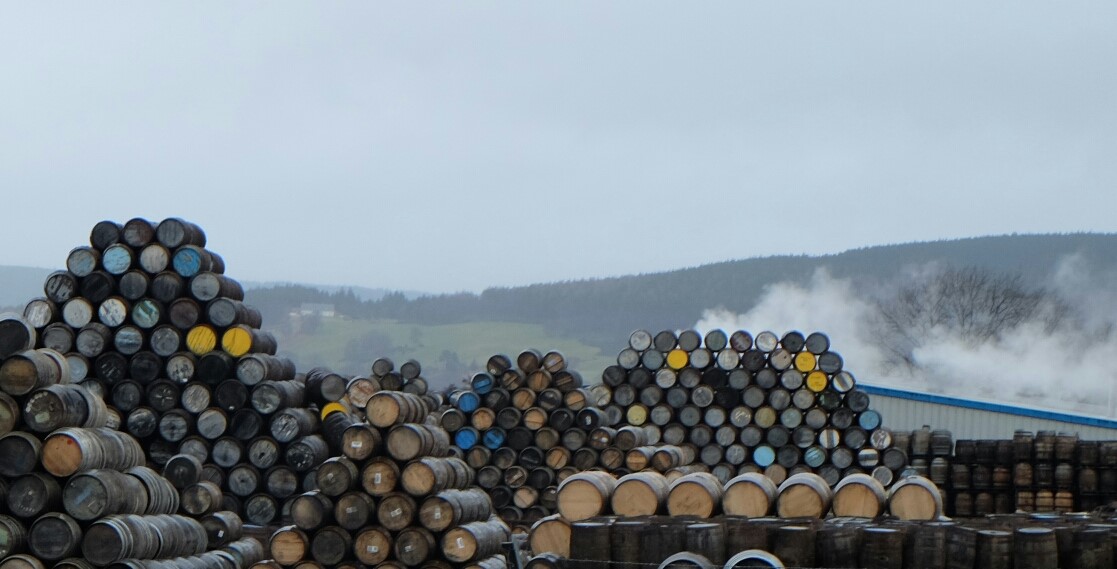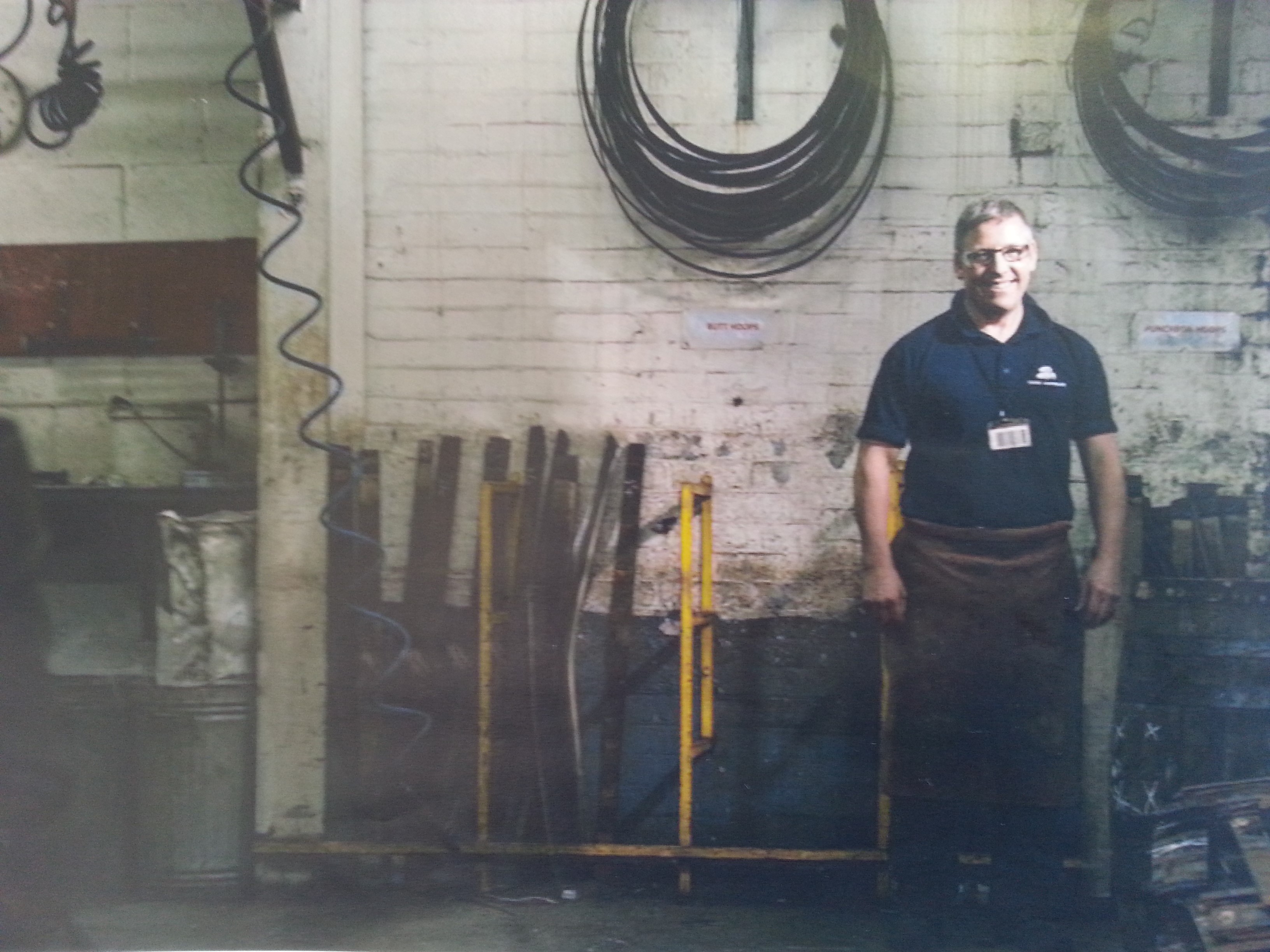
In late February 2016, I was travelling on a daily basis to a cooperage site in Scotland, to conduct several interviews with coopers for the purpose of examining the quality of their jobs. The coopering trade is a disappearing craft in the Scottish Whisky Industry, mainly because it has been under intense pressure from multinational companies, who have been acquiring local whisky manufacturers and seeking to maximise production and profits.
Coopers have a long tradition in the Spirits Industry in Scotland, and their working practices have remained more or less the same since the trade began [records evidence states that the trade exists for 500+ years]. Their main task is to repair or produce casks that will be used for spirit maturation. The labour process itself is mostly manual-driven, and involves a great level of skill in shaping the wood [staves] and fastening the cask together. Coopers work is undertaken within their individual bench, which encompasses disassembling casks by taking off the hoops that hold the wood together; evaluate the wood for cracks and porosities and repair them; cut wood to replace staves that are unrepairable; to spindle moulder to make the shape of the ends; assemble back the wood; and burn the wood for the exact required time [which varies according to the type of wood]. The skill to conduct these working tasks is acquired through an apprenticeship, which last exactly 4 years. The apprenticeship is based on a direct relationship between the apprentice and the journeyman. Although through the latter description it can be perceived aspects of craftsmanship, the most illustrative example is the tools they use. The majority of these tools have passed from generation to generation, and they still hold the same utility they had since they were built decades ago.

The craft of coopering is regarded by companies as quintessential to the production of casks so they can sustain and mature the spirit, as well as for the image of whisky as “hand-crafted” that most spirits companies want to promote in the consumer market. However, coopers’ high wages based on a piece rate system, the high levels of employment, the standard type of contract [permanent full-time], the fixed working hours [from 7.30am to 4.30pm, Monday to Thursday], has led spirits companies to pressure coopering sites to adopt modern working practices based cost-effectiveness, labour flexibility, and mechanization.
Coopers are also known in the Industry for their combativeness and their effective means of struggle, which are based on high rates of union membership and on a strong identity. Although in the last years the situation has changed slightly [where cooperage sites have become semi-automatized and labour flexibilisation widely used], in some sites, coopers have been able to maintain the old ways of coopering. The cooperage site I visited during my fieldwork was one of such places.
The interviewed coopers identified two different but interrelated factors for being successful in maintaining certain aspects of job quality intact: first, the strong levels of unionization; and second reliance on their craftsmanship skills in order to maintain high quality standards in the production process. It was by maintaining high levels of quality standards of work that coopers were able to maintain control over the production process, and keep management way from grasping the knowledge and techniques necessary to understand the craft. Although the union is indeed an important aspect in regulating the interference of management into the labour process, what seems interesting in this case study is the coopers’ reliance on their “skills” [craftsmanship] as part of a resistance mechanism. It is the coopers’ determination to do “quality work” – being craftsmen – that protects their own work. According to Sennett (2008:9) craftsmanship is “the desire to do a job well for its own sake”, i.e. the perseverance of wanting to do a job well is to assure the perpetuation of that same job. Sennett (2006) also argues that craft motivations can be indirectly noticeable in the damaging consequences of flexible working arrangements that limit quality production, such as temporary contracts that prevent workers from committing to long-term skill development.
This is interesting in the light of how workers’ relation to the work itself – the quality of work – and their skills can impact on dualistic models of resistance and control (Burawoy, 1979) in order to preserve job quality. It has been widely criticized Braverman’s (1974) deskilling thesis for failing to acknowledge worker agency. Important and innovative research has addressed this gap, by exploring how workers’ resistance, consent, and accommodation make part of managerial workplace control (Thompson, 1990; Thompson and Ackroyd, 1995; Thompson and Newsome, 2004). In this way, these authors have explored how management can integrate the worker subjectivity into workplace control. A subsequent research to this latter, has also contributed to this debate by examining workers subjective mechanisms to avoid managerial control. A friend and colleague of mine has offered me a book that addresses this issue in a unique way. Roland Paulsen (2013) in the book “Empty Labor – Subjectivity and Idleness at Work” describes and theorizes on workers’ appropriation strategies of working time as an opposing mechanism to management control. Paulsen identifies four types of mechanisms: slacking, enduring, coping and soldiering. By providing several examples within these mechanisms, Paulsen focuses on workers that have a special aversion to work or are particularly demotivated, and in a way seek to distance from or undermine work and the production process. It is Paulsen’s argument that by doing this, workers meliorate their job quality experience.
Hence, the craft-based resistance encountered in the cooperage case study, grounded on the motivation and perpetuation of performing quality work, provides the opportunity to explore the issue of workplace control from a different perspective. In this way, coopers’ capacity to maintain, reproduce and utilise skills – with the back of strong union membership – can inform and enter the dynamics of workplace control and resistance so that certain job quality aspects are protected.
References
Braverman, H. (1974). Labour and Monopoly Capital: The Degradation of Work in the Twentieth Century. New York and London: Monthly Review Press.
Burawoy, M. (1979). Manufacturing Consent: Changes in the Labor Process under Monopoly Capitalism. Chicago: University of Chicago Press.
Thompson, P. and Newsome, K., 2004. Labor process theory, work, and the employment relation. Theoretical perspectives on work and the employment relationship, pp.133-62.
Paulsen, R. (2013). Empty Labor: Subjectivity and Idleness at Work. (Doctoral dissertation). Uppsala: Uppsala universitet.
Sennett, R. (2006). The Culture of the New Capitalism. New Haven: Yale University Press.
Sennett, R. (2008). The Craftsman. London: Allen Lane.
Thompson, P. (1990). Crawling from the wreckage: The labour process and the politics of production. In: D Knights and H Willmott (eds) Labour Process Theory. London: Macmillan, 95–124.
Thompson, P. and Ackroyd, S. (1995). All quiet on the workplace front? A critique of recent trends in British industrial sociology. Sociology 29(4): 615–633.